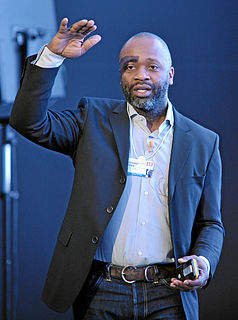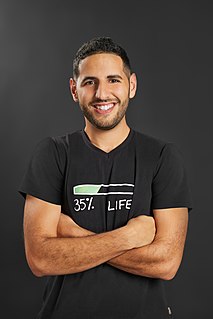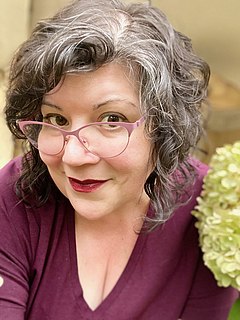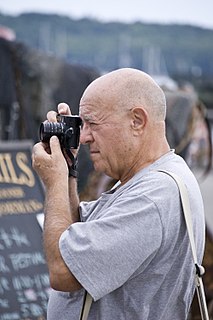Цитата Theaster Gates
Реальность района, в котором я живу, такова: если я не могу постоянно согласовывать то, что имею, с тем, чего нет у других людей, то либо мне нужно уйти и быть среди других людей, у которых есть то, что есть у меня, либо я постоянно вовлечены в этот динамический поток возможностей и обмена.
Связанные цитаты
Вы знаете, что мы постоянно берем. Мы не производим большую часть еды, которую едим, мы ее, во всяком случае, не выращиваем. Мы носим одежду, которую делают другие люди, мы говорим на языке, разработанном другими людьми, мы используем математику, которую другие люди разработали и построили на протяжении всей своей жизни. Я имею в виду, что мы постоянно берем вещи. Это прекрасное экстатическое чувство — создавать что-то и вкладывать это в бассейн человеческого опыта и знаний.
Экономическая философия черного национализма означает только то, что наш народ необходимо перевоспитать в понимании важности контроля над экономикой сообщества, в котором мы живем, а это означает, что нам не придется постоянно участвовать в пикетировании и бойкотировании других людей. в других сообществах, чтобы получить работу.
Поток людей в обстановке, их изменяющиеся отношения друг к другу и окружающей среде, их постоянно меняющиеся выражения и движения — все это в совокупности создает динамичные ситуации, которые предоставляют фотографу безграничный выбор того, когда нажимать кнопку. Выбрав точное пересечение между субъектом и временем, он может превратить обычное в необычное, а реальное в сюрреалистическое.
Когда вы встречаете людей, которых знаете по другим фильмам — как это часто случается со мной и как это часто случается с вами, когда вы актер, — вы постоянно встречаете людей, которых видели в других фильмах. Но когда это люди, которые оказали сейсмическое влияние на вашу жизнь, это довольно необычно.
Я не знал, как проверить чужие каналы. Когда я запустил Instagram, я просто публиковал сообщения! Но затем в какой-то момент, примерно восемь месяцев назад, я понял, что могу видеть то, чем делятся другие люди. Это было так захватывающе и так весело, но я как будто уже вошла в ритм обмена и не беспокоилась о том, на что это похоже по сравнению с другими учетными записями. Я думаю, что это было своего рода защитой, в некотором роде.
Я думаю, что Трамп очень усложнил людям чтение, и точка. Он все равно усложнил мне жизнь. Часть его зла заключается в том, что оно постоянно отвлекает нас, постоянно переворачивает наш горизонт. Отказаться от компьютера на три часа сейчас — значит пропустить год драмы. Это программно и свойственно другим автократическим режимам нашего времени.
Знаешь, в Лос-Анджелесе ты постоянно в своей машине, ты опломбирован, ты не ходишь. В то время как в Нью-Йорке через какое-то время все ваши вещи так или иначе становятся достоянием общественности. Я не говорю, что любой из них плохой; они оба отлично подходят для очень специфического комика. И я рад, что они оба существуют.
Мы постоянно удивляемся тому, что люди делали что-то хорошо до нашего рождения. Мы постоянно отмечаем тот факт, что вещи делаются хорошо не нами, а другими людьми. «Японцы — замечательные маленькие люди», — говорим мы, как будто делаем им одолжение. «Он араб, но вы должны послушать, как он играет на цитре». Почему "но"?








































